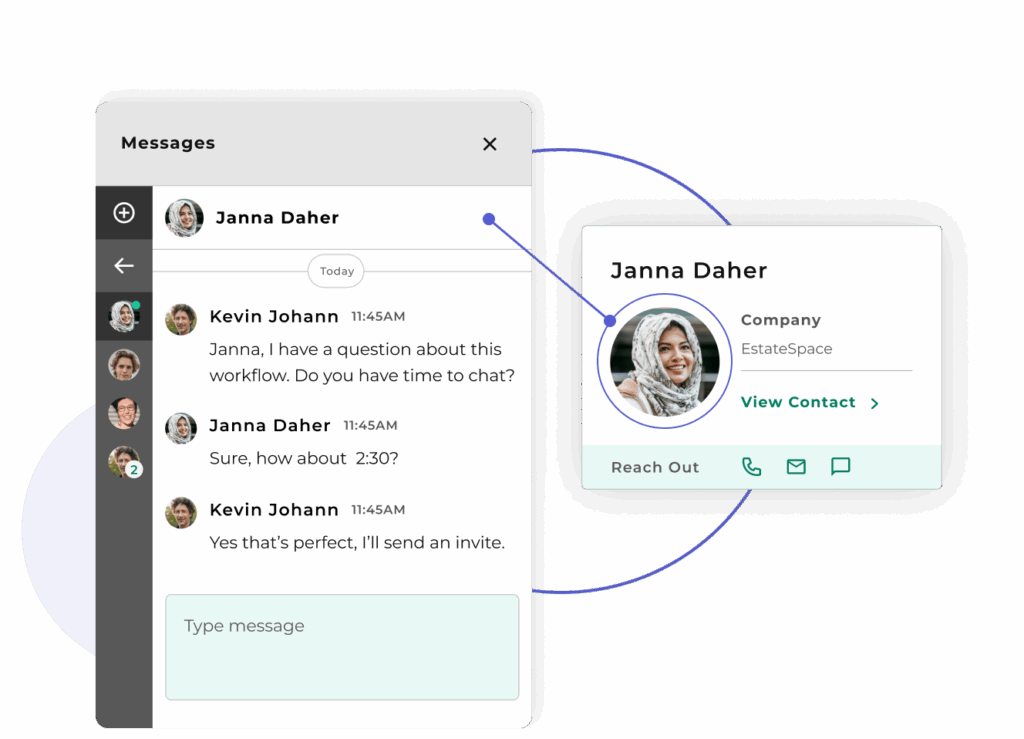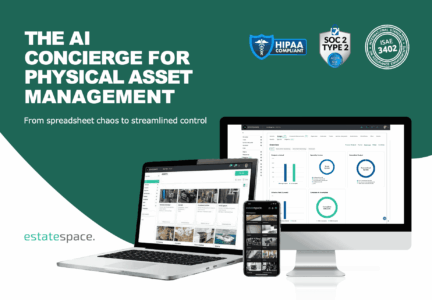Estate communication has become one of the most critical challenges facing estate managers and property operations professionals today. Managing multi-property operations requires sophisticated coordination. Ensuring seamless information flow between property owners, estate managers, and service providers demands more advanced approaches than traditional methods can deliver.
Estate management professionals operate across different time zones, communication preferences, and technological comfort levels. Meanwhile, estate operations have grown exponentially more complex. This involves everything from property management and vendor coordination to maintenance scheduling and project oversight. Effective estate communication isn’t just about sharing information—it’s about creating transparency, building accountability, and ensuring operational continuity.
The Estate Communication Challenge
Today’s estate managers and property operations professionals face unprecedented communication complexity that extends far beyond simple information sharing:
Text and Email Chaos where critical information gets buried in endless message threads. As a result, this makes it impossible to track decisions, approvals, or follow-up actions.
Paper-Based Documentation that creates bottlenecks when invoices, contracts, and maintenance records remain in physical files. Consequently, these documents become inaccessible to remote stakeholders.
Reactive Problem Management instead of proactive service delivery. Therefore, managers constantly respond to crises rather than preventing them through systematic oversight.
Client Service Fulfillment Gaps where concierge requests and lifestyle management needs get lost. Specifically, this happens between different communication channels and staff members.
Vendor Task Confusion as service providers receive conflicting instructions through multiple communication methods. Subsequently, this leads to delays and quality issues.
Expense and Invoice Tracking that relies on manual forwarding of receipts and approvals through email. Hence, this creates accounting delays and approval bottlenecks.
Staff Coordination Challenges where household teams operate with incomplete information. Furthermore, they lack visibility into schedules, preferences, and priorities across multiple properties.
Reporting Inefficiencies that require manual compilation of updates from various sources. Thus, this consumes valuable time that should focus on strategic oversight.
Traditional email chains, text messages, and phone calls simply cannot handle this level of complexity while maintaining the transparency and security that modern estate communication requires.
Why Traditional Estate Communication Methods Fall Short
Most estate managers still rely on fragmented communication approaches that create dangerous gaps in understanding and accountability. Furthermore, these outdated methods often result in:
Information Silos where different property owners, staff, and service providers operate with incomplete information. Additionally, they receive conflicting details through different text messages and email chains.
Technology Disconnect as critical approvals get delayed. Moreover, invoices and receipts remain trapped in paper-based filing systems.
Security Vulnerabilities when sensitive property and operational information gets shared inappropriately. Specifically, this happens through unsecured text messages and personal email accounts.
Reactive Management Cycles where estate managers spend their time firefighting problems. Instead, they lack proactive systems that prevent issues.
Client Service Breakdowns when concierge requests fall through communication cracks. Consequently, this leads to disappointed clients and damaged relationships.
Vendor Coordination Failures where service providers receive conflicting instructions through multiple channels. As a result, this results in duplicated work and service gaps.
Expense Management Chaos as receipts and invoices circulate through email threads. Therefore, this creates approval delays and accounting nightmares.
Staff Performance Issues when team members lack visibility into priorities and expectations. Subsequently, this leads to inconsistent service delivery.
Moreover, these communication failures often manifest during critical moments—property emergencies, client requests, or vendor coordination—when clarity and speed are essential.
How Modern Estate Communication Platforms Transform Family Operations
Leading estate managers are implementing comprehensive estate communication platforms. Furthermore, these systems transform reactive operations into proactive service delivery. Specifically, these advanced systems address the core requirements of sophisticated estate communication:
Centralized Information Management eliminates text and email chaos. Additionally, all property owners, staff, and service providers access the same accurate, up-to-date information through organized, searchable channels.
Digital Documentation Systems replace paper-based processes with secure digital workflows. As a result, this makes invoices, contracts, and maintenance records instantly accessible to authorized stakeholders.
Proactive Service Protocols shift operations from reactive problem-solving to systematic prevention. Specifically, this happens through automated alerts, scheduled maintenance, and predictive analytics.
Integrated Client Services streamline concierge fulfillment and lifestyle management. Moreover, they connect requests directly to staff assignments and vendor coordination workflows.
Unified Vendor Management eliminates conflicting instructions. Therefore, service providers receive clear, centralized task assignments and real-time status updates.
Automated Expense Processing transforms invoice and receipt management through digital workflows. Consequently, this accelerates approvals and simplifies accounting integration.
Staff Coordination Tools ensure household teams have complete visibility. Furthermore, they can see schedules, client preferences, and operational priorities across all properties.
Executive Reporting Capabilities generate comprehensive summaries automatically. Thus, this eliminates manual compilation while providing professional updates for stakeholder reviews.
Additionally, these platforms reduce administrative overhead by 33% while improving response times and shifting operations from reactive to proactive service delivery.
Real-World Impact for Estate Communication
For example, consider the estate manager who previously spent mornings sorting through dozens of text messages from vendors. Additionally, they hunted for receipts in email attachments and manually updated property owners through separate phone calls. Moreover, paper invoices required physical delivery for approvals. Meanwhile, client concierge requests often got overlooked in the communication chaos.
However, with integrated estate communication platforms, all vendor communications flow through organized channels with automatic task tracking. Furthermore, digital expense management eliminates paper-based bottlenecks. Additionally, proactive client service protocols ensure concierge requests receive immediate attention and systematic follow-through.
Ultimately, the transformation extends beyond efficiency. As a result, estate managers report shifting from reactive crisis management to proactive service delivery. Furthermore, they see improved client satisfaction when communication becomes more transparent and systematic.
The Six Pillars of Effective Estate Communication
Modern estate communication platforms address the critical requirements that distinguish institutional-grade property operations:
Information Transparency provides appropriate access to estate operations, maintenance performance, and project planning discussions based on operational protocols
Secure Communication Channels ensure that sensitive property and operational information remains protected while enabling necessary collaboration and decision-making
Multi-Stakeholder Accessibility accommodates different communication preferences while ensuring that critical information reaches all relevant property stakeholders effectively
Operational Integration connects communication directly to property management, vendor coordination, and maintenance scheduling to eliminate information gaps
Decision Documentation maintains comprehensive records of property decisions, vendor selections, and maintenance planning discussions for operational continuity purposes
Professional Reporting generates executive-level summaries that support property reviews, operational meetings, and strategic planning activities

How EstateSpace Enhances Estate Communication
Recognizing the critical importance of effective operational communication, EstateSpace provides comprehensive solutions that address the unique challenges of sophisticated estate operations:
Streamlined Property Coordination
Centralized Communication Hub: All estate-related discussions, decisions, and updates occur within secure, organized channels that preserve conversation history and ensure appropriate access controls
Multi-Platform Integration: Property stakeholders can access information and participate in discussions through their preferred devices and communication methods while maintaining security standards
Automated Updates: Proactive notifications ensure that relevant stakeholders receive timely information about property status, maintenance activities, and operational decisions
Enhanced Transparency and Accountability
Decision Audit Trails: Comprehensive documentation of property decisions, vendor selections, and maintenance planning discussions supports operational continuity and project management requirements
Performance Analytics: Clear reporting on estate operations, maintenance effectiveness, and vendor performance helps property managers make informed decisions about operations and strategic planning
Cross-Property Visibility: Unified dashboards provide complete oversight of operations across multiple properties, enabling strategic coordination and resource optimization
Professional Estate Management Support
Vendor Communication Integration: Streamlined coordination between property stakeholders, estate managers, and service providers reduces response times and improves service quality
Emergency Communication Protocols: Structured approaches to urgent situations ensure that critical information reaches appropriate stakeholders quickly while maintaining privacy standards
Operational Documentation: Systematic preservation of estate knowledge, vendor relationships, and operational procedures supports smooth transitions during staff changes or property management updates
However, implementing comprehensive estate communication doesn’t require overhauling existing property operations. Instead, the best platforms integrate seamlessly with current relationships and protocols while eliminating inefficiencies that create frustration and risk.
For estate managers handling complex property portfolios, understanding how systematic maintenance coordination connects to effective communication can significantly improve both operational efficiency and stakeholder satisfaction.
Transform your estate communication from reactive coordination to strategic advantage.
EstateSpace provides the institutional-grade platform that brings the same sophistication to operational communication that estate managers expect from their property management and professional services.
Finally, ready to eliminate communication gaps while enhancing stakeholder coordination and operational efficiency?
Book a Strategy Session to see how EstateSpace revolutionizes estate communication for sophisticated property operations.



